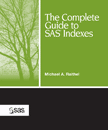Sometimes it happens. You’ve rearranged your busy schedule to find that perfect time to write your SAS conference paper, article, or book chapter. It’s early in the morning, or late at night, or a weekend day, or you took a day off from work. Your significant other, or girlfriend, or boyfriend is out-and-about for the day to give you the space you need to write. If you have children, they are attending a pre-planned, well-structured activity for the duration of your writing session. Your dog or cat has been fed and is asleep on the couch. The TV and radio are off and your phone is muted. So, you sit down in front of your computer, open your document, come up to speed on where you left off and then… nothing. The words just won’t come.
Don’t fret; it happens to all writers at one time or another. Joseph Heller once wrote “Every writer I know has trouble writing.” So, you are in good company when the words won’t come. Norman Mailer said “Being a real writer means being able to do the work on a bad day.” So, how can you still get work done when you are having a bad day? Here are a few tricks that I use:
- Review previously written material. You are going to have to revise other parts of your work, so take this opportunity to do so, now. It is often easier to revise already-written prose than to create new material.
- Outline your unfinished sections. If you have an outline that is separate from your manuscript, copy that outline into the manuscript. Create the headings for the sections and sub-sections of your work. See if you can add keywords to the various sub-sections that relate to the topics you will be covering in them.
- Research technical material. Take the time to research technical material you will be presenting. If there are gaps in your knowledge, access the SAS web site and look for more information on the SAS features and constructs you will be presenting. Browse SAS users group proceedings for technical papers on the topics you are writing about to verify that you have the latest information.
- Perform a data dump. Just dump out ideas on the page that relate to your topics without regard to proper grammar and punctuation. Get a bunch of ideas written down now so that you can go over them later and revise the writing.
The main idea is to take advantage of the time you have set aside as well as the ideal working conditions. Don’t let writer’s block ruin your opportunity to advance the SAS paper, article, or book you are working on. You can still be productive; but you may have to settle for a different type of productivity.
I originally had a great ending to this blog post in mind, but… the words just won’t come.
 Michael Raithel is the author of The Complete Guide to SAS Indexes and Tuning SAS Applications in the OS/390 and z/OS Environments, Second Edition. He's currently working on a new book How to Become a Top SAS Programmer. Visit his author page for bonus content, including free chapters and previously featured posts on this blog.
Michael Raithel is the author of The Complete Guide to SAS Indexes and Tuning SAS Applications in the OS/390 and z/OS Environments, Second Edition. He's currently working on a new book How to Become a Top SAS Programmer. Visit his author page for bonus content, including free chapters and previously featured posts on this blog.

1 Comment
Good suggestions Michael! That should greatly help to start writing again.